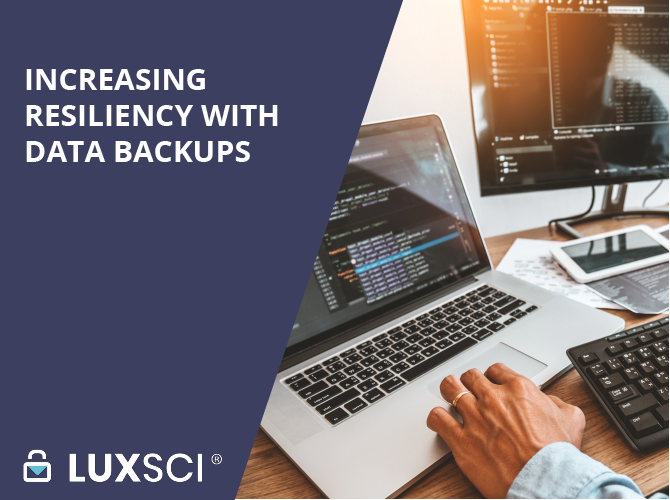Making backups of collected data is a critically important part of risk management. Backups provide redundancy in case of human errors, hardware failure, cyberattacks, power failure, and natural disasters. Properly implemented backups reduce risk and provide organizations flexibility when systems go down. Server outages, whether accidental or malicious, can be detrimental to business operations, and adequately implemented backups can help mitigate the effects and save time and money.
What is a Data Backup?
Backups are copies of data, files, and directories found on the disk at a specific time. Backups are used to restore files in case of an outage or accident. They are not the same as an email archive and are insufficient to meet compliance data storage requirements. This is because backups may not capture all sent and received data. If files are added and deleted in between backup times, they will not appear on the most recent backup. See Email Backup or Archival: What’s the Difference for more information.
LuxSci performs daily and weekly backups of email, WebAides, Widgets, MySQL databases, FTP, and website data in customer accounts. If data is misplaced or deleted accidentally, LuxSci’s support team can quickly and easily restore it from any available snapshots.
Ways to Configure Data Backups
How backups are configured can drastically affect how information is stored and retrieved. Backups are typically located on-site or off-site. On-site backups are located in essentially the same place as the original data, while off-site backups are located far away from the originals. It is fast and easy to recover data using an on-site backup. Still, if the location is affected by a cyberattack or natural disaster, both the original data and the on-site backups could be compromised or destroyed. Off-site backups are isolated from the original system and act as a fail-safe. It is slower to recover data from off-site backups and often costlier to maintain.
At LuxSci, we provide both on-site and off-site backups. This enables fast daily backups of recent changes and longer-term weekly backups. This backup schedule also ensures that separate, independent copies are kept in geographically distant locations for disaster planning reasons. We also create custom backup schedules for enterprise customers.
Preparing for Disaster
Cyberattacks like ransomware allow criminals to take control of an organization’s systems and hold data hostage. By backing up systems properly, administrators can restore data without paying the ransom.
Ensuring copies of data remain available even in an emergency requires extensive preparation and planning. It’s important to understand which systems and data are the most crucial and create a plan to protect them. Cyberattacks and natural disasters may limit access to on-site backups. In this case, it is helpful to have off-site backups available. Isolating off-site backups from the main infrastructure helps protect data in the event of a cyberattack or natural disaster.
Administrators should also take special consideration for confidential or sensitive information. When drafting a backup policy for disaster recovery, some issues to consider include:
- Identifying who is responsible for performing backups.
- Specifying where the backup data are to be located.
- Establishing how to access the files and how to log access to sensitive information.
- Creating a schedule for backing up data.
- Performing backups of digital data.
- Automating backups.
- Backing up the metadata along with the data.
- Encrypting data at rest.
- Determining how long to keep backups.
HIPAA Considerations
Compliance regulations may also influence the organization’s backup policy. It goes without saying that organizations that work with protected health information need to use a backup solution that is HIPAA-compliant. Backups need the proper access controls and encryption to comply with HIPAA regulations. To keep sensitive data protected and resistant to cyberattacks, contact LuxSci today.

